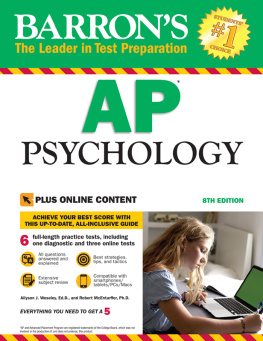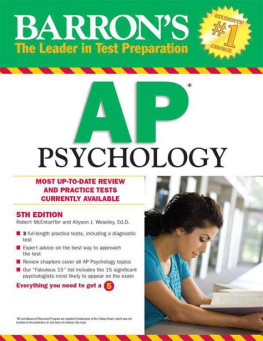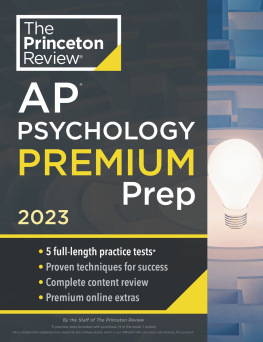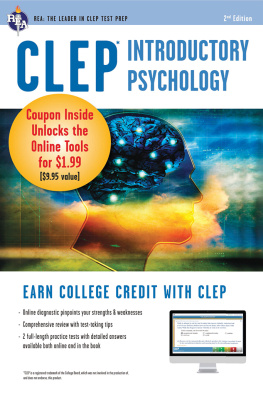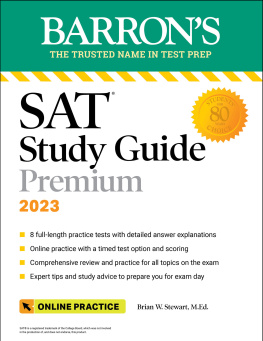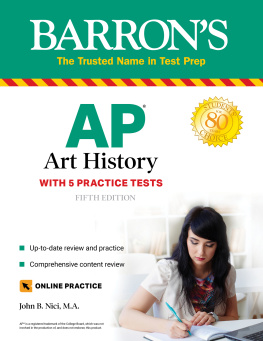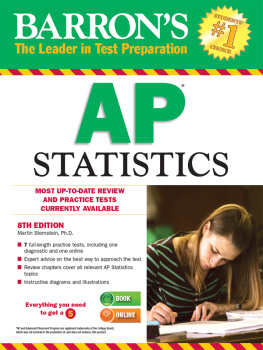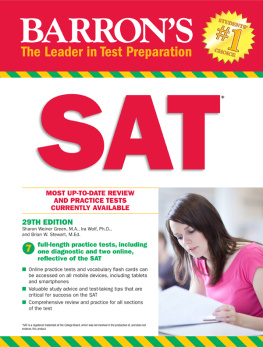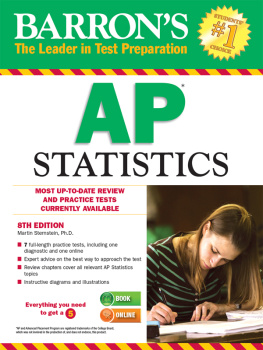

To Kristin, Esme, and Guy. And thanks for the careful proofreading, Esme.R.M.
To Sara, Kate, and EIi.A.W.
About the Authors
Rob McEntarffer taught AP Psychology at Lincoln Southeast High School in Lincoln, NE for over 13 years and Introductory Psychology at Nebraska Wesleyan University for over 7 years. He earned a B.S. in teaching of psychology at the University of Nebraska, a masters degree in educational psychology, and a Ph. D. in education. He has extensive experience in scoring the Advanced Placement Psychology free-response questions, having served as a Reader, Table Leader, and as the high school Question Leader. He is past chair of the national organization Teachers of Psychology in Secondary Schools, worked with the committee on the National Standards for the Teaching of High School Psychology, and is involved in writing assessment materials for high school and college level introductory psychology textbooks. He works as an assessment specialist for his school district.
Allyson Weseley has taught AP Psychology and run a Behavioral Science Research Program at Roslyn High School in Roslyn Heights, NY for over 20 years. Her students have enjoyed great success on the AP exam, with a 100% passing rate and well over 80% earning 5s. She earned an undergraduate degree in Psychology at Princeton University, a masters degree from the Harvard Graduate School of Education, and a doctorate from Columbia Universitys Teachers College. Dr. Weseley has served as a Reader and Table Leader for the AP Psychology exam, published a number of psychology-related activities, led several psychology teacher workshops, and served on the B oard of Teachers of Psychology in the Secondary Schools.
Copyright 2018, 2016, 2014, 2012, 2010, 2007, 2004, 2000 by Barrons Educational Series, Inc.
All rights reserved.
No part of this work may be reproduced in any form or by any means without the written permission of the copyright owner.
All inquiries should be addressed to:
Barrons Educational Series, Inc.
250 Wireless Boulevard
Hauppauge, New York 11788
www.barronseduc.com
eISBN: 978-1-4380-6519-9
Revised ePub date: February 2018
Contents

ONLINE
Access all three online tests at barronsbooks.com/ap/ap-psychology/e82ftwg4/
As you review the content in this book to work toward earning that on your AP PSYCHOLOGY exam, here are five things that you MUST know above everything else:
Know the p sychological p erspectives. Psychological researchers study the mind and behavior from different perspectives. Each perspective uses some unique research methods, concepts, and vocabulary to describe and explain thinking and behavior. Knowing the vocabulary and concepts associated with each perspective can help you better understand psychological theories and quickly narrow down possible answers to exam questions. For instance, if a question uses the term classical conditioning , you should be able to immediately identify the question as belonging in the behavioral area of psychology and look for answers that include other behavioral terms or key individuals. The psychological perspectives are introduced in Chapter 1 and form the basis for the discussion of personality, abnormal psychology, and treatment of psychological disorders found in Chapters 10, 12, and 13, respectively.
Know your terms. Psychological terms refer to specific concepts, and it is important that you dont confuse these terms with pop psychological ideas or the casual ways nonpsychologists use the same words. For example:
To a psychologist, people diagnosed with antisocial personality disorder (Chapter 12) are not shy or unfriendly but rather callous and unfeeling toward others.
Learning in psychological terms refers to much more than learning in school and is divided into many specific kinds of learning such as classical and operant conditioning. You can read more about this in Chapter 6.
You should make sure that you understand the specific, scientific meaning of psychological terms. Most of the multiple-choice items on the exam (which determine the majority of your final score) measure your knowledge and ability to apply psychological terminology.
Psychology is a science. Psychological researchers use the scientific method to gather data and test hypotheses about the mind and behavior instead of relying on intuition, what the majority of people believe, or common sense. Often what people refer to as common sense offers contradictory ideas. Regarding attraction, common sense tells us both that opposites attract and that birds of a feather flock together. Psychological researchers carefully gather data about topics like attraction to reach conclusions rather than relying on common sense. The Methods chapter of this book describes in detail how psychologists gather data and test hypotheses, and understanding research methodology is vital to your performance on the exam and your understanding of the science of psychology.
A pplication is key. The AP Psychology test is designed to measure your knowledge of psychological concepts and ability to apply these concepts. Exam items (especially the free-response ones) usually require you to go beyond defining terms by applying them to a scenario or making connections between different concepts. However, the AP Psychology exam is not designed to measure your writing ability or ability to express your knowledge in creative or unique ways. The measurement goal of this exam is to assess your knowledge of psychological concepts and your ability to apply this knowledge.
Use what psychology teaches you about cognition (Chapter 7) to improve your study habits. You have been a student for many years, and no doubt youve received advice about how to study and developed your own study habits. Use what psychology teaches you about cognition to improve your study habits. Studying for the AP Psychology exam is an opportunity for you to modify your study methods based on the research findings about the effectiveness of different encoding and recall techniques. For example:
Memory research clearly indicates that distributed practice (spacing your studying over a span of days or weeks) is much more effective than massed practice (cramming all your studying just before the test).
Memory techniques like chunking, mnemonic devices, and context cues can dramatically improve your ability to recall sets of terms and save you hours of study time.
The information-processing model predicts that focusing on the meaning, context, and application of psychological ideas will increase your ability to recall and use psychological ideas.
Research indicates that students can (and should) take advantage of the testing effect; you should interrupt your reading and studying with frequent small tests of your knowledge. Use practice questions at the end of each chapter to test your knowledge.
Welcome to Barrons AP Psychology, 8th Edition e-Book version!
Throughout this book, you will find hyperlinks that will help you navigate through the content, bring you to helpful resources, and allow you to click back and forth between practice questions and answers.
Remember, since this is an e-Book, passages, illustrations, graphs, equations, etc., will appear differently depending on what kind of device you are viewing these on. Please adjust your settings accordingly.

Next page
